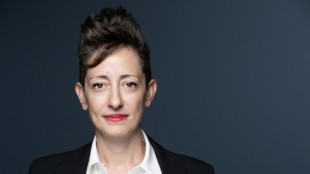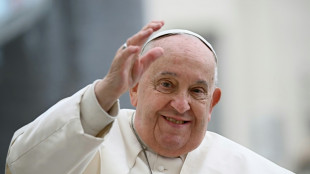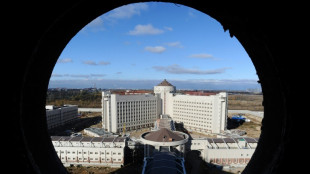
-
 German flying taxi start-up's rescue deal collapses
German flying taxi start-up's rescue deal collapses
-
Court of Arbitration for Sport rejects Rubiales ban appeal

-
 S.Africa wants 'inclusive' talks on ending Ukraine war, invites Zelensky
S.Africa wants 'inclusive' talks on ending Ukraine war, invites Zelensky
-
Postecoglou wants Spurs to 'kick on' after turning corner

-
 Rickelton hits century as South Africa rout Afghanistan in Champions Trophy
Rickelton hits century as South Africa rout Afghanistan in Champions Trophy
-
Ireland expect 'galvanised' hosts, as Wales try to quiet 'outside noise'

-
 French-Lebanese architect to redesign British Museum galleries
French-Lebanese architect to redesign British Museum galleries
-
Stock markets diverge, oil prices slide

-
 History inspires Darge as Scotland eye five wins in a row over England
History inspires Darge as Scotland eye five wins in a row over England
-
'Queen of Pop' Madonna lambasts 'King' Trump

-
 Apple says halting data protection tool for UK users
Apple says halting data protection tool for UK users
-
Rangers boss Clement not distracted by US takeover reports

-
 Andreeva defeats Rybakina in Dubai to become youngest WTA 1000 finalist
Andreeva defeats Rybakina in Dubai to become youngest WTA 1000 finalist
-
Ramos starts at 10 for 'competitive' France against Italy

-
 US pushes Zelensky to sign Ukraine resources deal
US pushes Zelensky to sign Ukraine resources deal
-
France far-right leader cancels US speech after 'Nazi gesture' by ex-Trump aide

-
 Netanyahu vows militants to pay as Hamas cites 'error' over Bibas body
Netanyahu vows militants to pay as Hamas cites 'error' over Bibas body
-
Ramos starts at 10 for France against Italy

-
 Merlier edges UAE Tour sprint as Pogacar retains lead
Merlier edges UAE Tour sprint as Pogacar retains lead
-
Tech, auto, medicines: who will pay Donald Trump's tariffs?

-
 Female chefs condemn sexism in British kitchens
Female chefs condemn sexism in British kitchens
-
Conan expects 'galvanised' Wales, Reffell keen to change outside noise

-
 Italy make two changes for Six Nations clash with France
Italy make two changes for Six Nations clash with France
-
US, China economic leaders raise 'serious concerns' in first call

-
 Amorim insists Man Utd 'improving' despite slump
Amorim insists Man Utd 'improving' despite slump
-
'Obsessed' Arteta wants Arsenal title charge

-
 Davis Cup draw postponed as Chile protests Belgian knockout win
Davis Cup draw postponed as Chile protests Belgian knockout win
-
England's Willis realises boyhood Six Nations dream against Scotland

-
 Pope marks week in hospital amid questions over future
Pope marks week in hospital amid questions over future
-
German far left in surprise comeback ahead of election

-
 World champion Brignone storms to Sestiere giant slalom
World champion Brignone storms to Sestiere giant slalom
-
Haaland a doubt for Man City showdown with 'exceptional' Liverpool

-
 Chelsea draw Copenhagen in Conference League last 16
Chelsea draw Copenhagen in Conference League last 16
-
German anti-fascist activist on trial in Hungary over alleged assault

-
 French skier Alphand flown to hospital after training crash
French skier Alphand flown to hospital after training crash
-
Oscar setback, Trump cast shadow over queer film

-
 Barcelona's Flick upset by referee harassment
Barcelona's Flick upset by referee harassment
-
Rickelton ton propels South Africa to 315-6 in Champions Trophy

-
 Daughter of British IS victim reads last texts to him at France trial
Daughter of British IS victim reads last texts to him at France trial
-
Maresca sets top four target for Chelsea

-
 Sweden investigating new Baltic Sea cable damage
Sweden investigating new Baltic Sea cable damage
-
French PM under growing pressure over Catholic school abuse claims

-
 Man Utd to face Real Sociedad in Europa League last 16, Rangers play Fenerbahce
Man Utd to face Real Sociedad in Europa League last 16, Rangers play Fenerbahce
-
Itoje urges England to 'seize our moments' against Scotland

-
 US-Ukraine resources deal still on table despite Trump-Zelensky spat, Kyiv says
US-Ukraine resources deal still on table despite Trump-Zelensky spat, Kyiv says
-
Russia sells famed imperial prison at auction

-
 Argentina to observe two days national mourning for Bibas brothers
Argentina to observe two days national mourning for Bibas brothers
-
Liverpool draw PSG, Madrid clubs clash in Champions League last 16

-
 Wales' rugby woes - three talking points
Wales' rugby woes - three talking points
-
Ill-prepared trekkers swarm Mt Etna for high-altitude selfies

| JRI | -0.02% | 12.817 | $ | |
| CMSC | -0.07% | 23.384 | $ | |
| RBGPF | 3.53% | 67.22 | $ | |
| CMSD | -0.09% | 23.45 | $ | |
| NGG | 0.26% | 61.26 | $ | |
| RIO | -0.08% | 64.24 | $ | |
| SCS | -1.02% | 12.305 | $ | |
| BCC | -9.4% | 106.47 | $ | |
| BCE | 0.86% | 23.775 | $ | |
| RELX | -1.99% | 49.426 | $ | |
| AZN | 1.05% | 74.29 | $ | |
| RYCEF | -1.16% | 7.74 | $ | |
| BP | -0.32% | 34.06 | $ | |
| BTI | -2.08% | 37.765 | $ | |
| GSK | -0.38% | 36.42 | $ | |
| VOD | 1.55% | 8.39 | $ |

DR Congo unrest sparks biggest refugee wave to Burundi in 25 years
Burundi is dealing with its biggest influx of refugees in 25 years as families flee the escalating conflict in the Democratic Republic of Congo, the United Nations refugee agency said.
Rwandan-backed M23 fighters have made big gains in the eastern DRC, seizing the cities of Goma and Bukavu, prompting warnings to the UN Security Council and stoking fears of a regional conflagration.
The United Nations warned on Wednesday that the M23 "continues to advance towards other strategic areas" in the eastern Congolese provinces of North and South Kivu.
South Kivu's provincial capital Bukavu, home to some one million and bordering Rwanda, is roughly 50 kilometres (30 miles) from Burundi.
"This is the largest number of refugees that Burundi has seen since the beginning of the 2000s," Brigitte Mukanga-Eno, representative for the UN refugee agency UNHCR in Burundi, said on Wednesday.
"Over the past few days and weeks, we have received thousands of people here in Burundi," she told a press conference in Bujumbura, estimating roughly "30,000 people" had crossed.
"People are still pouring in by the thousands every day."
- Refugees flee shooting -
The Burundian government said Monday that around 10,000 people had crossed the country's western border, fleeing the violence in the DRC.
"I fled with my wife and two children even before the M23 arrived," Kitenge, who preferred to give only one name, told AFP on Wednesday evening.
The 25-year-old motorbike taxi rider said armed groups had "started firing in all directions", leaving the family no option but to run.
"We preferred to flee for our lives," he said.
Another man, Amissi, a 30-year-old teacher who also gave only one name, fled from Kamanyola, near the Burundian border.
Speaking to AFP by telephone, Amissi said Burundian officials had "locked us up" in a stadium near the border.
He said they were "not allowed to go out and get supplies, even if we have money, while they haven't given us anything to eat so far".
Interior minister Martin Niteretse said the government intended to relocate the refugees to eastern Burundi, "in order to guarantee their safety". He added they would be granted refugee status.
Prior to the recent escalation in the conflict, the UNHCR said that Burundi was already hosting roughly 90,000 people -- mainly Congolese -- who had fled previous bouts of violence in the mineral-rich but conflict-stricken eastern DRC.
Some 500 Congolese soldiers and police also arrived in the border town of Gatumba on Wednesday, witnesses and a security source said.
The security source said they were disarmed and searched.
- Regional war fear -
Bintou Keita, head of the UN's DRC peacekeeping mission (MONUSCO), expressed concern to the UN Security Council over M23's advance, which she said Wednesday is approaching the "the junction of the three borders between the DRC, Rwanda and Burundi."
Huang Xia, the UN Secretary-General's special envoy for the Great Lakes region, told the Security Council on Wednesday that M23 and its allies were continuing their advance towards "other strategic areas" in North and South Kivu, warning "the risk of a regional conflagration is more real than ever".
Since October 2023, Burundi has sent more than 10,000 soldiers to help the Congolese army against the M23 and other armed groups.
Late Wednesday military and official sources said some Burundian troops were staging a "tactical withdrawal", although the army's spokesman denied any retreat.
The fighting in recent weeks has raised fears of a repeat of the Second Congo War, from 1998 to 2003, which drew in multiple African countries and resulted in millions of deaths from violence, disease and starvation.
W.Lapointe--BTB

